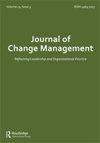The Colours of Change Ownership: A Qualitative Exploration of Types of Change Agents’ Psychological Ownership During School Change
IF 3
Q2 MANAGEMENT
引用次数: 0
Abstract
ABSTRACT The organisational literature has overlooked the diversity of change agents’ psychological ownership experiences in the context of major (or second-order) change. The present study addressed this lacuna. The study used the case study method and focused on six Israeli state-religious schools, which adopted a new liberal curriculum. Thirty-one semi-structured interviews were conducted with six principals and 25 teachers (middle-level managers and educators). Analysis of the findings revealed the types of psychological ownership that change agents experience (ownership by process, by interest, and by means); two main components of the agents’ psychological ownership (accountability and territoriality); and three perceived types of sharing associated with ownership (active, passive, and defensive). The implications of the findings are discussed. MAD statement Building on a real case study of major change in public schools, the paper describes the varieties of psychological ownership during change implementation. Committed change agents can have different types of ownership experiences, different drives that make them accountable to the change at hand, different territorial outlooks, and different sharing orientations. Three ideal types of psychological ownership experiences are suggested and practitioners can use them to diagnose organisational dynamics and intervene in the process.变革所有权的颜色:学校变革过程中变革主体心理所有权类型的定性探索
摘要组织文献忽视了在重大(或二阶)变革背景下,变革主体心理所有权体验的多样性。本研究解决了这一空白。该研究采用了案例研究的方法,重点关注了六所以色列国立宗教学校,这些学校采用了新的自由主义课程。对6名校长和25名教师(中层管理人员和教育工作者)进行了31次半结构化访谈。对研究结果的分析揭示了改变主体所经历的心理所有权类型(通过过程、兴趣和手段的所有权);代理人心理所有权的两个主要组成部分(问责制和属地性);以及与所有权相关的三种感知共享类型(主动、被动和防御)。讨论了研究结果的含义。MAD声明基于对公立学校重大变革的真实案例研究,本文描述了变革实施过程中心理所有权的变化。致力于变革的推动者可以有不同类型的所有权体验,不同的驱动力使他们对眼前的变革负责,不同的地域观和不同的共享取向。提出了三种理想类型的心理所有权体验,从业者可以利用它们来诊断组织动态并干预这一过程。
本文章由计算机程序翻译,如有差异,请以英文原文为准。
求助全文
约1分钟内获得全文
求助全文
来源期刊

JOURNAL OF CHANGE MANAGEMENT
MANAGEMENT-
CiteScore
6.60
自引率
20.00%
发文量
14
期刊介绍:
Journal of Change Management is a multidisciplinary and international forum for critical, mainstream and alternative contributions - focusing as much on psychology, ethics, culture and behaviour as on structure and process. JCM is a platform for open and challenging dialogue and a thorough critique of established as well as alternative practices. JCM is aiming to provide all authors with a first decision within six weeks of submission.
 求助内容:
求助内容: 应助结果提醒方式:
应助结果提醒方式:


